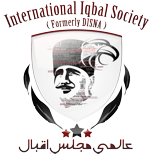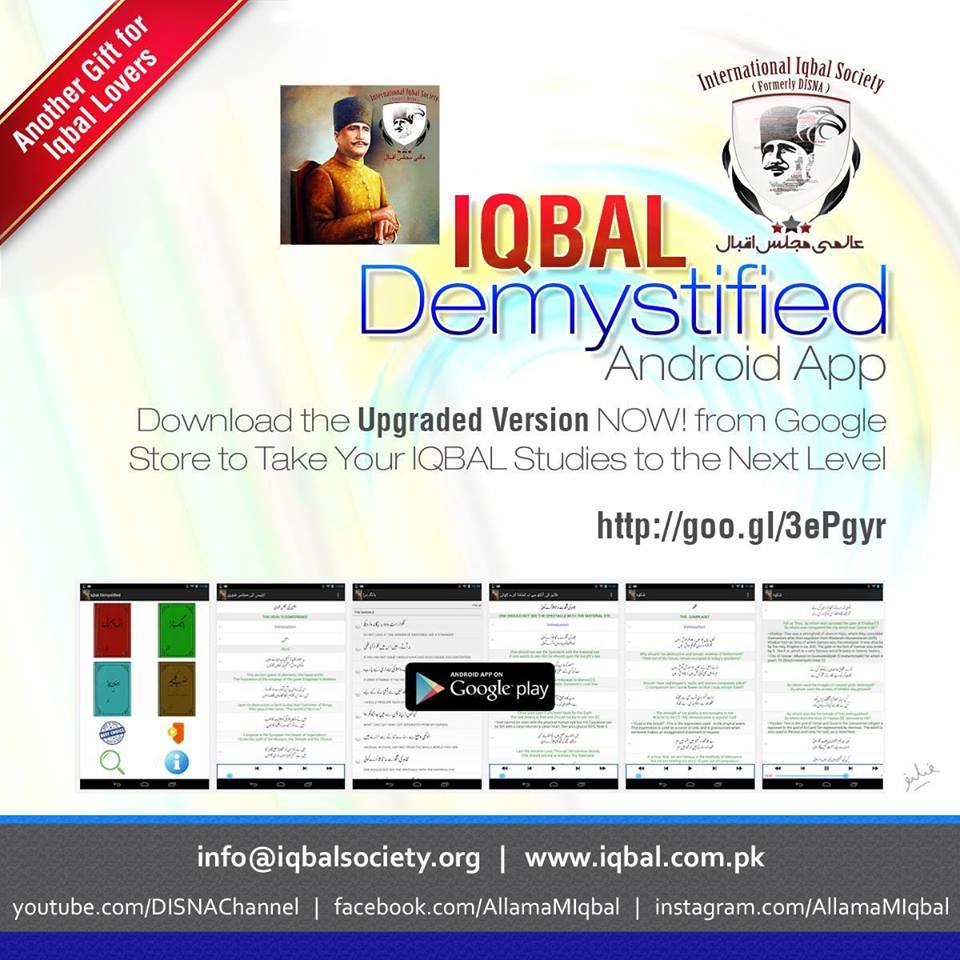The Message of Iqbal
The Message of Iqbal
Justice (R) S. A. Rahman
“Poetry is the criticism of life,” said Mathew Arnold. Iqbal turned this into the dictum “Life is criticism of Poetry”1. This saying of his provides the key-note to an understanding of his position in the world of Letters. He was par-excellence the singer of life’s symphony. Art and literature are, according to his view, subservient to life and unless they fulfill the demands of the vitalistic urge in humanity, they are merely instruments of decadence and degeneration. From the very start of his poetic carrier, he was conscious of his mission as a seer and an inspirer of the heroic role of man, in his earthly existence.
The beginning of the twentieth century witnessed an awakening of the dormant spirit of Asia and the Far-East. For long it had groaned under the crushing heel of Colonialism and Imperialism. In the Indo-Pak Subcontinent, Iqbal, in the initial stage of his development, wrote striving nationalistic poems that thrilled his readers. Although he retained his hatred of Imperialism and Colonialism till the end of his days, he later outgrew the bounds of territorial nationalism as a political concept. He became the apostle of Muslim renaissance in this sub-continent and the ideological founder of the Pakistan Concept. He did not live enough to see the fruition of his dream of an independent Muslim homeland which he had declared to be the final destiny of the Muslim majority areas in the North-West of India. But by his writings and speeches he had furnished a solid foundation for the work of Quaid-i-Azam Muhammad Ali Jinnah, the Founder-Father of the Pakistan State. It may, therefore, be justly claimed that Iqbal was the exponent of Islamic values. Some critical voices have been heard at times to suggest in consequence that he was parochial of communal in his outlook. This kind of criticism involves a superficial judgment. Iqbal’s thought is religious but as Prof. R.A. Nicholson pointed out in his introduction to the translation of the Asrar-i-Khudi, he did not treat philosophy as the hand-maid of Religion.2 If a dispassionate view it taken, it will be found that the Islamic values sponsored by Iqbal are broad humanitarian values, according to western standards.
The Islamic fraternity cuts across all divisive boundaries be they geographical, ethnic or chromatic. Iqbal was profound student of cultural history, sociology and philosophy. In his search for the ideal society, he could not ignore the colour-blind and race-blind cosmopolitan sociopolitical system of Islam. Indeed he regarded this ideological community as the nucleus of a world-wide “democracy of more or less unique individuals, presided over by the most unique individual possible on this earch3.” As he himself put it in his letter to Prof. Nicholson, “Nietzsche had a glimpse of this ideal race but his atheism and aristocratic prejudices marred his whole conception.4″ The power-drunk, amoral superman of Nietzsche is different from the Perfect Man of Iqbal, whose thoughts and actions are all subject to the highest moral discipline and whose existence is a source of inspiration and light to a democratic community of highly integrated individuals.
Iqbal had reached his concept of the Perfect Man long before he had come into contact with the writings of Nietzsche. His researches had convinced him that the decadence of oriental peoples was principally due to their adoption of fatalistic ideas which induced in them a quietist and escapist attitude as compared with a life of struggle and dynamic endeavor inculcated by Islam in its pristine purity. Greek philosophy had reached the Muslims in a neoplatonic version and had, under the influence of certain pantheistic Sufi schools, generally encouraged a life of mystic contemplation by the individual who became less and less concerned with questions of collective good. In such a system of thought, the phenomenal world came to be depreciated in the scale of values and individual salvation was supposed to consist in the absorption of the human unit of existence into the supreme monistic reality that embraces all things . Iqbal held that the spirit of Islamic culture was anti-classical being empirical in character rather than being contemplative or even purely metaphysical. The doctrine of personality or
is the central pivot around which his thought revolves. The ego or the self of the individual is to be fortified by a life of constant discipline and ceaseless struggle against the environment, with the eye firmly fixed on the ideal of acquisition of divine attributes in accordance with the well-known Hadith:
The guiding star of man should therefore be love and not intellect . The term
is equated with the desire to assimilate and absorb and thus overcome all obstructions posed by matter and in its highest manifestation, it is identified with love of God which in reality means the love of man’s own ideal nature. Such love affirms the existence of the seeker and the sought and individualizes both.
(Thought entertained doubts with regard to my existence. It was love that revealed the secret that I exist). All life is individual, God himself being the most unique individual. The ego is strengthened by love and weakened by asking, Soul which includes all forms of acquisition having no relation to one’s personal efforts. The son of a rich man who lives on inherited wealth alone, is really a beggar and so is everyone who thinks the thoughts of others. Each man must carry his own burden, as the Quranic injunction prescribes. It is only by self-discipline and obedience to the law that the individual reaches that plane of self-affirmation where God himself consults him in ordering things:-
(Raise yourself to such heights that before a destiny is ordained, God inquires from his servant “What is you will”?).
Iqbal thinks that we are not living in a closed and finished universe. On the contrary the universe is in the process of constant development and man can also assist in such a process. For the word of God gives the attribute of (the best of those who create) to the Supreme Being and this implies the possibility of sub-creators albeit with limited capacities. The nearer an individual approaches God, by a life of creative and disciplined activity, the more free and perfect he becomes. One should therefore live dangerously and plunge into the tumultuous sea of life and not merely seek a haven of refuge on its tranquil shore:-
By maintaining a constant tension in the personality or self, by a life of ceaseless struggle, one can aspire to personal immortality so that it even becomes immune to the shock of death. Man, in his mundane existence, is partly determined and partly free. He is, of course, constrained within certain limitations by the laws of Nature but in his inner self he is free to make choices as he is endowed with an individual will. This opens up possibilities of infinite progress for the individual, which may even extend beyond the mortal span of life. It is only thus that man can justify the Quranic appellation of Khalifat-Ullah fil ‘Ard God’s Viceregent on earth.
Intellect and reason are not however, to be despised or discarded. They are instruments evolved by life itself for the conquest of Nature. When Iqbal condemns (intellect) in contrast with (Love), the shafts of his criticism are really aimed at the particular use of the former made by rationalists in undermining the moral structure of life. Intellectual exercise is only one stage in the life – process:-
(Proceed beyond intellect for its illumination is like that of the wayside lamp and it is not identical with thy destination).
Iqbal disagrees with Kant that the ultimate Reality is beyond our finite understanding. He regards intuitive consciousness as furnishing a supra-sensuous mode of apprehending Reality. The time-honoured tradition of Divine Revelation to individuals, specially attuned to the Infinite, must therefore be accepted as providing us with a sure base of eternal truth in the midst of the phenomena of change.
The individual, however, is not a law unto himself. He lives and has his being in a human environment which cannot be ignored. Indeed Iqbal holds that the individual can only reach his full stature in the corporate life of a community. He uses in this context the beautiful simile of the River and the Wave.
(The wave exists in the River. Outside its banks, it is non-existent).
In his (Secrets of selflessness) Iqbal has expounded his philosophy of the relationship between the individual and the community. Without the communal discipline, the individual tends to be wayward and to lose sight of the objectives of life. It is by living among and for his fellow-men that the individual experiences the ennobling fire of love and learns the values of equality and fraternity that should embrace all mankind within their fold. The personal identity of a people has to be maintained by the formation of collective life-centers. But to confine oneself within the limited and narrow circle of a geographical territory would be mere earth-rootedness and inconsistent with wider human values.
Iqbal had drunk deep at the founts of Eastern and Western thought. The sources of his inspiration are mainly Islamic though he has expressed himself in the modern idiom borrowed from Western philosophy. He represents the finest flowering of Indo-Islamic culture in the Sub-continent which owes a great deal to Iranian culture. He adopted Persian as the medium of expression for some of his works so to reach a larger audience than would otherwise have been possible and because he found his mode of thought to be in harmony with expression in Persian:-
He acknowledges Maulana Jalal-ud-Din Roomi as his Preceptor and Guide at various places in his works. He says:
(The Master of Rum transmuted my earth to gold
and set ashes aflame
A wave and I will come to rest in his Sea
That I may make the glistening pearl mine own
I who am drunken with the wine of song
Draw life from the breath of his words).
A beautiful poem of his in the Zabur-e-Ajam starts with the verse:
(I burn as the poppy’s lamp in your avenue,
o youth of ‘Ajam, on my soul and yours)
Through his link with the Persian tradition, Iqbal has joined the company of the elect who do not belong only to one time or clime but who are acknowledged as the benefactors of humanity at large. That’s way the late Malik–ush-Shu’ora Bahar said about him:-
(The present age has become the era of Iqbal)
In this connection it is interesting to note Iqbal’s own prophesy:
(After I am gone, they will read my verse and understand and say “A man conscious of his self, changed a whole world).
Note and References
- Nicholson A.R. The Secrets of the Self.
Muhammad Ashraf, Lahore and Farhan
Publishers, Lahore 1977 p. xiii - Ibid
- Ibid p. xxviii
- Ibid pp xxviii-xxix
Source:
Iqbal and Muslim Renaissance
by Justice (R) S.A. Rahman






